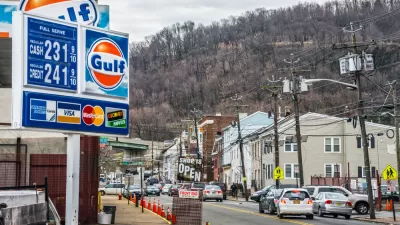California's cap-and-trade market saw its largest carbon sale, $1.02 billion, thanks to millions of motorists now paying about a dime a gallon for the right to emit carbon for the first time since the program began in November 2012.
"Companies spent more than $1 billion in California’s latest sale of carbon emissions credits, making it the largest auction since the controversial cap-and-trade program began in late 2012, state officials said (Feb. 25)," writes business and economics reporter, Dale Kasler for The Sacramento Bee.
The reason: State officials dramatically expanded the pool of credits for sale to accommodate a surge in demand. That became necessary because the cap-and-trade market has been broadened since Jan. 1 to cover the carbon coming from motor vehicle tailpipes.
One credit = allowance to emit one ton of carbon. In other words, the "carbon externality" is history in California thanks to the only state cap-and-trade program in the United States. One clarification: the carbon charge is paid by wholesale fuel suppliers who presumably pass on the charge (derided by opponents who called it a 'hidden gas tax'), about a dime a gallon, to fuel retailers.
Kasler describes the mechanics of the February 18 carbon auction. The Air Resources Board "dramatically increased the volume of available credits...to limit the impact on consumers." Consequently, the price was in line with prior auctions: $12.10 per credit.
Quebec now in California program: "Last week’s auction was the second sale held jointly with the Canadian province of Quebec," writes Kasler. "Credits purchased in California can be used to emit carbon in Quebec, and vice versa."
The California program differs from Washington State proposal: As noted here and here, Gov. Jay Inslee (D-Wash.) proposed a carbon tax to pay for transportation infrastructure. However it would be applied to industrial, not tailpipe emissions. It also differs from the California program where revenue from the sale of carbon allowances are required to be spent on programs to reduce carbon emissions, e.g., high speed rail, public transit, and the new Affordable Housing and Sustainable Communities program.
Writing on another carbon pricing strategy proposed for Oregon, the carbon tax, or more specifically, the carbon tax and dividend, Streetsblog's Angie Schmitt describes the plan proposed by Oregon Climate that would tax "wholesale fossil-fuel transactions" and rebate all revenue to citizens rather than applying it to carbon-reducing activities as is done in California. "The carbon tax would need to secure a majority of the popular vote and 60 percent of the state legislature to be enacted," she notes in a correction.
Hat tip to Jackie@Climate Plan.
FULL STORY: Companies spend $1 billion in latest California carbon auction

Planetizen Federal Action Tracker
A weekly monitor of how Trump’s orders and actions are impacting planners and planning in America.

Map: Where Senate Republicans Want to Sell Your Public Lands
For public land advocates, the Senate Republicans’ proposal to sell millions of acres of public land in the West is “the biggest fight of their careers.”

Restaurant Patios Were a Pandemic Win — Why Were They so Hard to Keep?
Social distancing requirements and changes in travel patterns prompted cities to pilot new uses for street and sidewalk space. Then it got complicated.

Platform Pilsner: Vancouver Transit Agency Releases... a Beer?
TransLink will receive a portion of every sale of the four-pack.

Toronto Weighs Cheaper Transit, Parking Hikes for Major Events
Special event rates would take effect during large festivals, sports games and concerts to ‘discourage driving, manage congestion and free up space for transit.”

Berlin to Consider Car-Free Zone Larger Than Manhattan
The area bound by the 22-mile Ringbahn would still allow 12 uses of a private automobile per year per person, and several other exemptions.
Urban Design for Planners 1: Software Tools
This six-course series explores essential urban design concepts using open source software and equips planners with the tools they need to participate fully in the urban design process.
Planning for Universal Design
Learn the tools for implementing Universal Design in planning regulations.
Heyer Gruel & Associates PA
JM Goldson LLC
Custer County Colorado
City of Camden Redevelopment Agency
City of Astoria
Transportation Research & Education Center (TREC) at Portland State University
Camden Redevelopment Agency
City of Claremont
Municipality of Princeton (NJ)




























